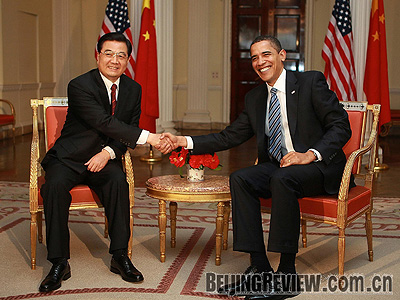| The G20 summit meeting in London gathered leaders from 20 major economies and international institutions. During the event, participating leaders also held sideline bilateral meetings. The April 1 meeting between Chinese President Hu Jintao and U.S. President Barack Obama was the first between the two heads of state since Obama came into office in January.
 |
|
FIRST MEETING: Presidents Hu Jintao and Barack Obama greet each other before their talks in London on April 1 (JU PENG) | During their talks, the two heads of state exchanged views on bilateral and international issues, confirming that a growing Sino-U.S. relationship would not only benefit both sides, but also the whole world, especially during the global financial crisis.
Hu suggested that the Sino-U.S. relationship should have three characteristics. The first is positive. Despite their different social systems, historical backgrounds, cultural traditions and development levels, the two countries should treat each other in a positive way. The second is cooperative. The two countries should work together to address complex challenges facing human society in the 21st century. In this way, they can achieve mutually beneficial cooperation and realize common development, said Hu. The third is comprehensive. The Chinese president said that China and the United States should enhance economic cooperation and better coordinate their efforts on issues including counterterrorism, nonproliferation, law enforcement, energy conservation, climate change, science and technology, education, culture, healthcare and military exchanges. They also need to strengthen communication and coordination on regional and international affairs, so as to enrich the strategic contents of the bilateral relationship.
Hu said that the Sino-U.S. relationship has gotten off to a good start since President Obama took office. "Good relationship between China and the United States is not only in the interests of the two peoples, but also beneficial to the peace, stability and prosperity of the Asia-Pacific region and the world as a whole," he said.
Obama echoed Hu's views. "I said publicly our relations are not only important for citizens of the two countries, but also help set the stage for how the world deals with a host of challenges," he said.
Hu pointed out that mutual respect for and consideration of each other's core interests are key to ensuring the sound and stable development of the Sino-U.S. relationship. The Taiwan issue remains the most important and sensitive one in the relationship, he said.
For his part, Obama reaffirmed the U.S. Government's commitment to the one-China policy and the three U.S.-China joint communiqués. He expressed support for improved relations across the Taiwan Straits and hoped for greater progress. Obama said that Tibet is a part of China, and that the United States will not support "Tibet independence."
Both countries should also take measures to stimulate world economic growth and development from a long-term perspective, they agreed, confirming that both sides would maintain coordination and cooperation in financial and economic fields. They also underlined the importance of reforming the international financial system, reinforcing financial regulation and maintaining international financial stability. They expressed support for global trade and investment flow, and promised to oppose protectionism.
Obama said that both the United States and China have benefited from their strong economic relationship, and the two countries should continue promoting trade and economic cooperation on this basis.
Presidents Hu and Obama announced the establishment of a China-U.S. Strategic and Economic Dialogue mechanism, with the first round of talks to be held in Washington, D.C., this summer. Obama accepted Hu's invitation to visit China in the second half of this year.
Observers believe the overall tone of future Sino-U.S. relations will be positive and progressive. Although there are differences and disputes between the two countries, they have more interests in common.
A face-to-face discussion would help the two leaders learn more about each other and build common understanding, which is very important for strengthening bilateral cooperation, said Jin Canrong, Deputy Dean of the School of International Studies, Renmin University of China.
In an interview with Xinhua News Agency on April 1, Jin said that in the past few years, China and the United States jointly contributed 50 percent to the world's economic growth. "At such a difficult moment, their joint efforts will help the whole world recover from the crisis sooner," said Jin.
| 